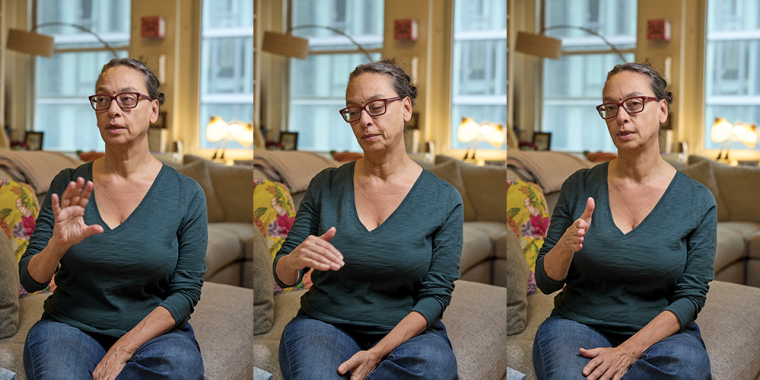What stands out to you in a query from a writer who is looking for representation? Does a prestigious bio matter, or is it more about the pitch?
It’s the pitch letter and the first few pages. As for a bio, I mean, you can be a good or bad writer with a good or bad bio. You can’t gauge much from that. It tends to be just the opening pages: A lot rides on that because we don’t have time to read full manuscripts from everybody who comes to us.

Nicole Aragi of Aragi, Inc. (Credit: Andres Hernandez, photo assistant Kuan Hsieh)
I learned that as a bookseller. Customers stand in a store, and they read the first three paragraphs; it’s ride-or-die in that situation. One of the things I’ve always said to people is, “Don’t tell me that it starts to get good on page 50, because nobody is going to get through pages 1 to 49. It’s just not realistic. Most of the things I’ve taken on, I’ve started to read them, and something happens in the first few pages where you think, “Wow, this person can really write.”
I’ve read a lot of things where I think, “This is really good,” but I wouldn’t know what editor to send it to or I wouldn’t know how to write a pitch letter that represented it well. I wouldn’t know how to talk about it to anybody in the outside world. Other times I read something, and I think, “Oh my God, I’ve got to send this to so-and-so, they’ll love it.” That’s the first step. It’s both liking it and knowing what you’ll do with it; otherwise you’re not providing the author with anything. They need you to know the right people to hand it to. They need you to be able to describe it in a way that people will be intrigued. That combination is what I’m looking for.
A lot of times, editors are not rejecting a manuscript because it’s “bad” per se. It’s more about asking, Am I the right person for this manuscript? Do I see that bigger picture and how I can pitch it and how I can edit this?
One of my closest friends is someone whose manuscript I turned down, and she once said, “Thank God you turned me down! I love my agent. They really understand what I’m doing; they really get it; this was the right thing.” She said it was a little hurtful at the time, because it can’t not be. I think your agent [needs to have] the right instincts, to understand when to say yes and no, and to be able to guide it perfectly, whereas I would’ve been, “Oh, I don’t know, what does everyone else think?” Nobody wants that in their agent; they want someone who is clear and decisive.
Sometimes a rejection is not a no, right? Sometimes it’s kind of “I’d be open to something else.”
It is. I mean, we all have different periods when we are too busy to do anything more. I’ve turned a lot of people down because I just haven’t got the time. I have an author who wrote a wonderful novel, and I read her stories at a time when I was completely overwhelmed with work, and I thought, “I can’t represent this; I just don’t have the hours in the day.” I wrote her a note saying, “I’m turning it down, but I think they’re wonderful stories, and if you don’t find an agent, come back to me with what you do next.” She did. It was the right time for me to read something and say yes. I [now] had the hours that I could allot to it all along the way, and I took it on, and it was fantastic. She was a finalist for the Booker Prize. It was a happy ending. She published the stories with an indie press and the novel with Grove. It was as it was meant to be.
Speaking of time management, do you believe agents should edit?
I edit the submission draft, the first draft that I ever go out with. I edit that quite a lot, and then it depends on the individual situation. If they have a good working relationship with their editor, I disappear. I do all the other stuff, but I don’t involve myself because otherwise you’ve got all these different people talking in your head as a writer and it doesn’t help. If things fall apart somewhere along the way and the editorial relationship falls apart, or we are moving houses and they need to strike a whole new relationship, then I go back in.
It varies based on circumstances, and I have writers who I gave a lot of notes to for their very first manuscript and never really said anything more than how much I love it. Occasionally I’ve said, “I really love this, but I have an issue here.” I don’t do a deep edit with someone who’s got a good working relationship with their editor because that’s what the editor is good for. I never send something out rough because people don’t have the tolerance for it. That first submission of a new writer, you want to get it as shiny as you can.
What are you excited about for the future, both for your list and for the agency?
Oh, boy, those are big questions. I mean, I just took on a writer and I’m going to be submitting her manuscript in the next week or so, and that’s a really exciting debut, and it’s always fun to submit a debut. We’re just working on the final polish of the manuscript I’m going to send out. I think you always get, as an agent, a sort of real buzz from seeing someone with their first book and it’s all new and fresh.
I’m not really taking much on as I’ve got a very full list. One of my authors said, “When will you have free time when you’re not reading?” I said I’ve never had a time when my desk didn’t have ten manuscripts on it. That’s just not how it works. I remember I used to take a day a week just to look for new things. I haven’t been able to do that in a long time, which is really depressing. [But] I’ve been building my list for myself for a long, long time, and the idea of it being a little bit bigger and incorporating other people’s interests and tastes is quite exciting. For the agency I hope to have lots and lots of occasions where I can watch someone in my tiny team seeing something through step by step and kind of enjoy things more in a wider way. [My assistant] Kelsey has very clear interests and tastes, and I just think she’s going to be a super agent. I’m going to sit there proudly while it happens.
I love the idea of fostering community, of paying it forward in some way.
Yeah. I mean, it never occurred to me that that would be exciting, but it really has been. I’m sure the time will come when Kelsey will do that for someone else, and maybe that’s how publishing will always work, because you do need to have room to develop first your taste and then all the relationships. For an author, they need someone who understands contracts, who has all the right contacts, and who has a clear vision of a book. That takes a while to develop, and if you don’t give someone that time, then there’s no future agent. Someone gave me that time, and I would like to do the same. I look back, and Gloria was lovely to me. Gloria represents Ta-Nehisi Coates. I mean, she has her finger on the pulse, having done it for forty, fifty years. You just think, “Wow, that’s really impressive.” I hope when I’m eighty I can still go [gestures moving quickly with her hands]. Gloria had a very clear sense of her taste. I think that is one of the things about editors and agents. They all know what they like.
As an agent, what is the one piece of guiding-light advice that you like to give to writers?
Listen to feedback and be very aware it’s a community. I’m a little thrown when I see people behaving poorly. I just think, (1) why do you want to do that in life? and (2) why is that sensible? These are all people you depend on, who rely on the goodwill that you would like to have. If you’re going to be nasty, why should they help? Every now and then you see a sort of weird arrogance out there, and I just don’t get that. Other than that, every author has their own instincts, and they do things a partiCular way, and you just sort of give advice that fits them rather than a one-size-fits-all piece of guidance. I think I’m quite flexible, and I’m happy to work out what someone needs and then try to provide it.
I really like what you said about treating each other well. You’ve built a community with your list, with your authors, but it is also important for writers to have their community because writing can be a solitary endeavor, but publishing is a people business, and you do have to be nice. We have long memories!
Yes, everyone has a long memory. I know I do. I still remember one editor who was really nasty to me when I was Gloria’s assistant. They’re very charming to me now, but I’ve never forgotten and never will. We’re all human beings and we all want to get along. There are times in an agent’s job to be the combative one or to argue something, but it doesn’t have to be done in an unpleasant way. I’m advocating for the author, so obviously I’m not always going to be sweetness, but it does pay to remember that we are all part of an ecosystem, as they say, and also, it’s a nicer way to live.
I think that’s a beautiful place to end.
It’s a very optimistic, sunny way to end—in a year that hasn’t been optimistic or sunny.
Vivian Lee is a writer and a senior editor at Little, Brown.








